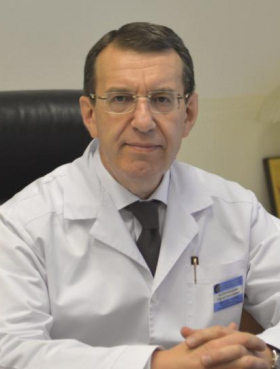Illarioshkin Sergey Nikolaevich
 Deputy Director for Research
Deputy Director for Research
D. Sci. (Med.), Professor, Corresponding Member of Russian Academy of Sciences
Education and Titles
- 1980-1986 – Student, I.M. Sechenov First Moscow Medical Institute, Faculty of medicine, Moscow, Russia
- 1986-1988 – Resident, Research Center of Neurology, Moscow, Russia
- 1988-1991 – PhD Student Research Center of Neurology, Moscow, Russia. 1992 Thesis “Phenotypic polymorphism and the role of mediator amino acids in hereditary spinocerebellar degenerations”
- 1997 – Doctor’s degree thesis: “Hereditary monogenic diseases of the nervous system: molecular analysis and clinical-genetic comparisons”
- 1993, 1995-1996 – Scientific internship on the molecular genetics of hereditary human diseases in the Department of Neurology, Institute of the Brain of the University, Niigata, Japan
- 1998, 1999 – Scientific internship in the Department of Pathology of Neurons, National Institute of Health and Medical Research of France (INSERM), based on the Hôpital universitaire Pitié-Salpêtrière (Paris)
- 2003 – Professor of Neurology
- 2016 – Corresponding Member of Russian Academy of Sciences
Career
- 1996-2003 – Senior, then Leading Research Assistant of the Neurogenetic Department, Research Center of Neurology;
- 1996-2003 – Academic secretary, Research Center of Neurology;
- 1996-2006 – Head of the DNA laboratory, Research Center of Neurology;
- 2003-present – Deputy Director for Research, Research Center of Neurology;
- 2004-2012 – Deputy chairman of the Bureau of the Scientific Council for Neurology of the RAMS and the Ministry of Health and Social Development of Russia;
- 2006-2022 – Head of the Brain Research Department, Research Center of Neurology;
- 2022-present – Head of the Brain Institute, Research Center of Neurology.
Additional Information:
- 2007-present – Vice-president of the European Federation of Neurological Societies (EFNS) and the European Agency of Neurology (EAN);
- 2009-present – President of the Russian National Society for the Study of Parkinson’s Disease and Movement Disorders;
- 2014-present – Deputy chairman of the Dissertation Council;
- 2014-2016 – Member of the Expert Council for the Therapeutic Sciences of the Higher Attestation Commission of the Ministry of Education and Science of Russia;
- 2016 -present – Member of the Presidium of the Higher Attestation Commission of the Ministry of Education and Science of Russia;
- Member of the Presidium of the Board of the Russian Society of Medical Genetics;
- Board Member of the Russian Society of Neurologists;
- President of the National Society for the Study of Parkinson’s Disease and Movement Disorders;
- Coordinator of the Russian section of the European Huntington’s Disease Network (Euro-HD Network);
- Member of the Management Committee of the European Commission of the Movement Disorders Society (MDS) for continuous dopaminergic stimulation;
- Deputy Editor-in-Chief of the journal “Annals of Clinical and Experimental Neurology”;
- Editor-in-Chief of the journal “Nervous Diseases”;
- Editor-in-Chief of the Bulletin of the National Society for the Study of Parkinson’s Disease and Movement Disorders;
- Member of the Editorial Board of journals: “Zhurnal Nevrologii i Psikhiatrii im. S.S. Korsakova” “Neurological Journal,” “Medical Genetics”.
Scientific Interests
- Parkinson’s disease and other neurodegenerative diseases (analysis of the molecular basis of development and progression, development of new methods of diagnosis, treatment and prevention);
- Hereditary diseases of the central nervous system (pathogenesis, molecular genetics, analysis of phenotypic polymorphism, diagnosis, development of new methods of treatment and prevention)
- Gene and Cell Therapy;
- Mapping of genes, mutation analysis and development of DNA diagnostics of hereditary monogenic psychoneurological diseases;
- Investigation of molecular neurophysiological and neurochemical mechanisms of brain plasticity in healthy individuals and in various types of pathological processes;
- Mechanisms of brain aging;
- Experimental neurology.
Illarioshkin S.N. is the author of 688 publications, including 12 monographs and manuals, 22 chapters in manuals, 6 tutorials, 13 patents for inventions.
Most cited works
Identical dysferlin mutation in limb-girdle muscular dystrophy type 2B and distal myopathy
- Illarioshkin, S.N., Ivanova-Smolenskaya, I.A.,Greenberg, C.R. et al. Identical dysferlin mutation in limb-girdle muscular dystrophy type 2B and distal myopathy. Neurology. 2000;
- Periquet, M.,Lücking (…), Illarioshkin S.N. et al. Origin of the mutations in the parkin gene in Europe: Exon rearrangements are independent recurrent events, whereas point mutations may result from founder effects. American Journal of Human Genetics. 2001;
- Illarioshkin, S.N.,Igarashi, S.,Onodera, O. Trinucleotide repeat length and rate of progression of Huntington’s disease. Annals of Neurology. 1994;
- Illarioshkin, S.N.,Ivanova-Smolenskaya, I.A.,Tanaka, H. et al. Clinical and molecular analysis of a large family with three distinct phenotypes of progressive muscular dystrophy. Brain.1996;
- Boldyrev, A.,Fedorova, T.,(…) Illarioshkin, S. Carnisone increases efficiency of DOPA therapy of Parkinson’s disease: A pilot study. Rejuvenation Research. 2008;
- Illarioshkin, S.N.,Ivanova-Smolenskaya, I.A.,Rahmonov, R.A. et al. Alcohol dehydrogenase alleles in Parkinson’s disease. Movement Disorders. 2000;
- Illarioshkin, S.N.,Tanaka, H.,Markova, E.D. et al. X-linked nonprogressive congenital cerebellar hypoplasia: Clinical description and mapping to chromosome Xq. Annals of Neurology. 1996;
- Shadrina, M.I.,Semenova, E.V.,(…) Illarioshkin, S.N. et al. Effective quantitative real-time polymerase chain reaction analysis of the parkin gene (PARK2) exon 1-12 dosage. BMC Medical Genetics. 2007;
- Slominsky, P.A.,Markova, E.D., (…) Illarioshkin, S.N. et al. A common 3-bp deletion in the DYT1 gene in Russian families with early-onset torsion dystonia. Human mutation.1999;
- Ivanova-Smolenskaya, I.A.,Ovchinnikov I.V. (…) Illarioshkin, S.N. The His1069Gln mutation in the ATP7B gene in Russian patients with Wilson disease [3]. Journal of Medical Genetics. 1999;
- Stelmashook, E.V.,Isaev, N.K. (…) Illarioshkin, S.N. Role of zinc and copper ions in the pathogenetic mechanisms of Alzheimer’s and Parkinson’s diseases. Biochemistry (Moscow). 2014;
- Illarioshkin, S.N.,Periquet, M.,Rawal, N. Et al. Mutation analysis of the parkin gene in Russian families with autosomal recessive juvenile parkinsonism. Movement Disorders. 2003.
Educational work
- 1998 – present. Professor, Research Center of Neurology.
- 2005 – present. Professor (Neurology), Faculty of Fundamental Medicine, Lomonosov Moscow State University.
S.N. Illarioshkin guided 3 Doctoral and 18 PhD thesis.